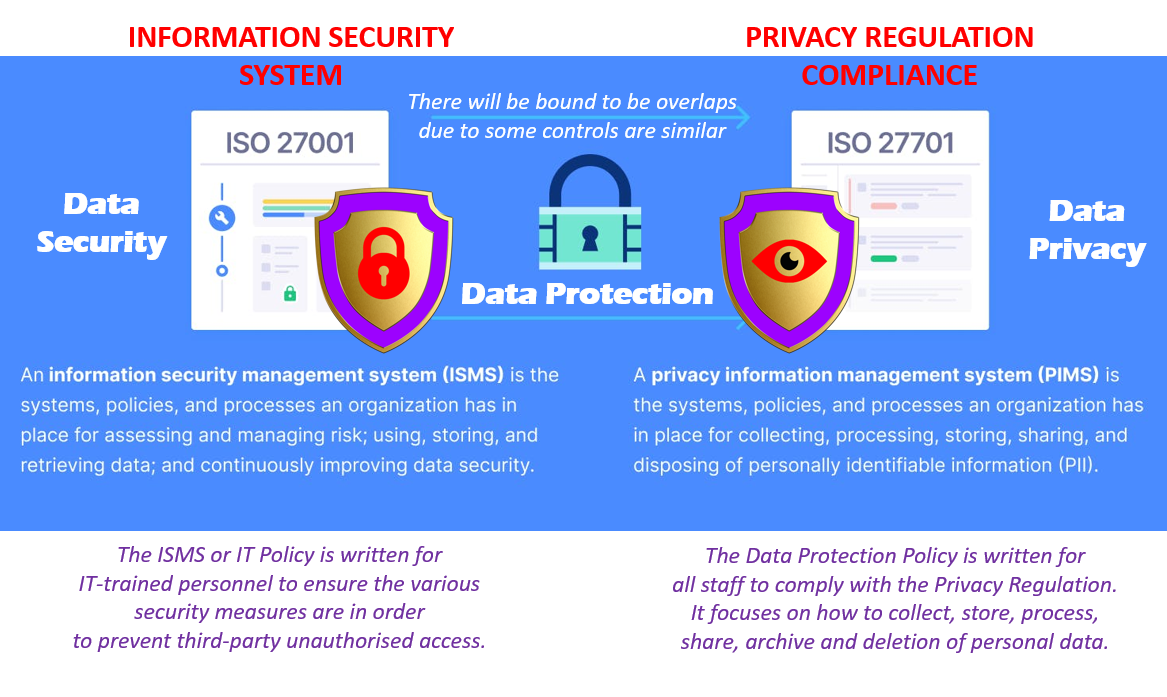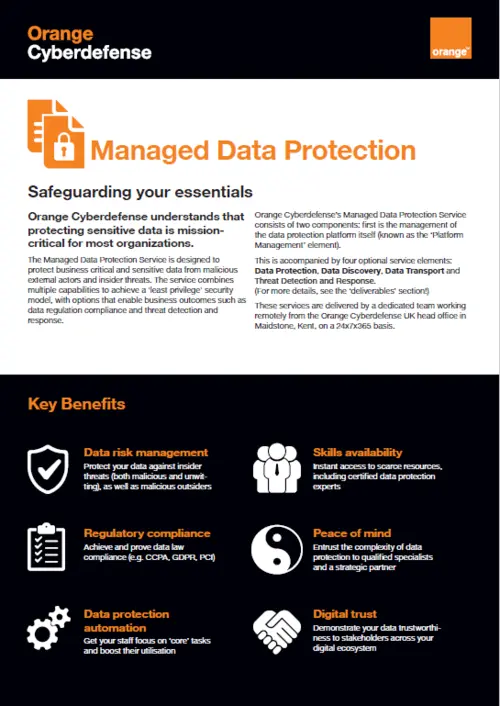How Managed Data Protection Solutions Can Protect Against Cyber Threats
How Managed Data Protection Solutions Can Protect Against Cyber Threats
Blog Article
Secure Your Digital Assets: The Power of Managed Data Security
In an age where information breaches and cyber risks are progressively prevalent, protecting digital possessions has become a paramount problem for companies. Taken care of information protection offers a calculated method for services to incorporate sophisticated security procedures, making certain not just the safeguarding of sensitive information yet likewise adherence to regulative criteria. By outsourcing information safety and security, firms can concentrate on their primary objectives while experts browse the intricacies of the electronic landscape. The efficiency of these services hinges on numerous aspects that call for careful factor to consider. What are the critical components to remember when discovering managed data defense?
Understanding Managed Information Protection

Secret elements of managed information security include information backup and recovery remedies, encryption, gain access to controls, and constant monitoring. These aspects function in performance to produce a robust security framework - Managed Data Protection. Normal back-ups are necessary, as they give recuperation alternatives in case of data loss as a result of hardware failure, cyberattacks, or natural disasters
Encryption is one more crucial element, transforming sensitive data right into unreadable layouts that can just be accessed by authorized individuals, thereby reducing the threat of unapproved disclosures. Accessibility controls even more enhance safety by ensuring that just individuals with the suitable approvals can engage with sensitive info.
Constant monitoring permits organizations to spot and react to possible threats in real-time, therefore strengthening their general data stability. By carrying out a taken care of information defense strategy, organizations can achieve greater resilience against data-related hazards, protecting their operational continuity and maintaining depend on with stakeholders.

Advantages of Outsourcing Data Safety And Security
Outsourcing information protection provides countless benefits that can significantly boost a company's general safety position. By partnering with specialized managed safety and security provider (MSSPs), companies can access a wide range of knowledge and resources that may not be available in-house. These providers employ skilled experts who remain abreast of the most up to date risks and protection measures, ensuring that organizations take advantage of current best innovations and methods.
One of the primary benefits of outsourcing data safety and security is set you back performance. Organizations can minimize the economic worry connected with hiring, training, and keeping internal safety and security workers. In addition, outsourcing permits companies to scale their security procedures according to their advancing demands without incurring the dealt with prices of maintaining a full time safety and security team.
Furthermore, outsourcing enables organizations to concentrate on their core organization functions while leaving intricate safety and security jobs to experts - Managed Data Protection. This tactical delegation of duties not only improves operational efficiency however additionally cultivates a proactive safety and security society. Inevitably, leveraging the capabilities of an MSSP can cause improved danger detection, decreased reaction times, and a more durable safety and security framework, original site positioning companies to navigate the dynamic landscape of cyber risks efficiently
Key Functions of Managed Provider
Organizations leveraging taken care of security solutions typically gain from a suite of key features that enhance their information protection approaches. One of one of the most significant features is 24/7 tracking, which makes certain consistent vigilance over data atmospheres, enabling quick detection and response to risks. This continuous security is complemented by innovative threat intelligence, allowing organizations to remain in advance of emerging vulnerabilities and risks.
An additional vital function is automated data backup and recuperation solutions. These systems not only secure data honesty yet likewise simplify the recuperation procedure in the occasion of data loss, ensuring organization continuity. In addition, handled services commonly include comprehensive compliance monitoring, assisting companies navigate complicated policies and keep adherence to sector standards.
Scalability is also a vital facet of managed services, making it possible for companies to adapt their data security measures as their requirements develop. Expert support from devoted security experts offers companies with accessibility to specialized knowledge and insights, boosting their general safety and security stance.
Picking the Right Supplier
Selecting the right service provider for handled data defense services is important for making certain robust protection and compliance. Look for well established companies with tested experience in data protection, particularly in your industry.
Following, analyze the variety of solutions supplied. A detailed managed information security copyright ought to consist of data back-up, healing services, and continuous monitoring. Make certain that their services straighten with your certain organization requirements, consisting of scalability to suit future growth.
Compliance with market guidelines is an additional vital variable. The copyright needs to stick to relevant standards such as GDPR, HIPAA, or CCPA, relying on your industry. Inquire regarding their compliance qualifications and techniques.
Furthermore, take into consideration the modern technology and devices they utilize. Suppliers must leverage advanced security actions, consisting of encryption and threat discovery, find this to protect your data effectively.
Future Trends in Data Defense
As the landscape of data protection proceeds to progress, several essential trends are emerging that will certainly form the future of taken care of data protection solutions. One notable trend is the raising fostering of man-made knowledge and artificial intelligence modern technologies. These tools enhance information security methods by enabling real-time danger detection and reaction, thus decreasing the moment to minimize prospective violations.
An additional significant trend is the shift towards zero-trust protection models. Organizations are acknowledging that traditional border defenses are poor, causing a more durable framework that continually validates customer identifications and device stability, no matter their area.
In addition, the increase of governing compliance requirements is pushing businesses to take on more comprehensive data security steps. This consists of not only protecting data however also making sure transparency and accountability in data handling practices.
Ultimately, the integration of cloud-based options is transforming information protection techniques. Managed data defense solutions are increasingly utilizing cloud innovations to supply scalable, versatile, and cost-effective remedies, allowing companies to adapt to changing needs and hazards successfully.
These trends underscore the value of proactive, ingenious strategies to data security in a progressively complicated digital landscape.
Final Thought
In you can check here final thought, managed data defense emerges as an important method for companies looking for to protect digital properties in a significantly complex landscape. Inevitably, welcoming taken care of information defense allows companies to concentrate on core operations while ensuring comprehensive protection for their digital properties.
Key parts of managed information defense include data backup and healing services, file encryption, accessibility controls, and constant tracking. These systems not just protect data stability however additionally enhance the healing process in the occasion of information loss, making sure service continuity. An extensive handled information defense copyright must consist of data backup, recovery solutions, and ongoing tracking.As the landscape of information security proceeds to progress, several crucial trends are arising that will form the future of taken care of information security solutions. Ultimately, embracing handled information protection enables organizations to concentrate on core procedures while making certain comprehensive safety and security for their electronic assets.
Report this page